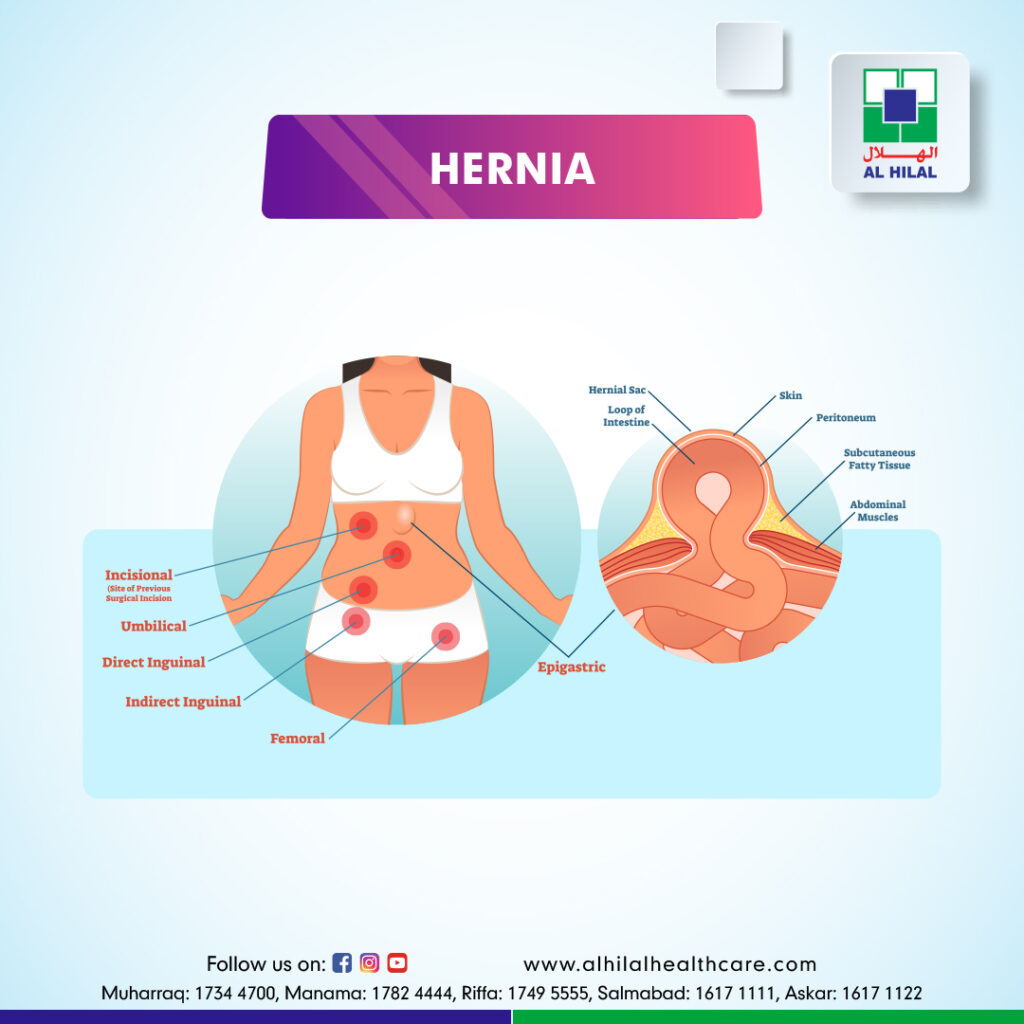A hernia is defined as an abnormal protrusion of the viscus or part of the viscus through an abnormal or normal opening in the cavity’s wall. In addition, an abnormal weakness or hole in an anatomical structure allows something inside to protrude. A hernia usually develops between your hips and chest. In most cases, it causes very few symptoms, although you may notice a lump or swelling in your tummy or groin.

TYPES OF HERNIA:
Mainly there are four types of Hernia. They are as follows:
-
- Inguinal Hernia: This type of Hernia is a protrusion of abdominal cavity contents through the inguinal canal. This generally happens when fatty tissue or a part of the bowel pokes into your groin at the top of your inner thigh. An inguinal hernia is otherwise called a groin hernia.
- Femoral Hernia: A femoral hernia is a bulge near the groin in the upper part of the thigh. In this, fatty tissue or part of the intestine protrudes into the groin at the top of the inner thigh. A femoral hernia is also called a femorocele. Femoral hernias are a relatively rare type, accounting for only 3% of all hernias. This type of Hernia mainly affects older women.
- Umbilical Hernia: This abnormal bulge can be seen or felt at the belly button. Umbilical hernias are common and typically harmless. Umbilical hernias are more common in infants, even though they can also be seen in adults. Umbilical hernias in infants and children are usually not painful. But those that appear during adulthood may cause abdominal discomfort.
- Hiatal Hernia: Hiatal Hernia or hiatus hernia is the protrusion of an organ, typically the stomach, through the esophageal opening in the diaphragm.
SYMPTOMS OF HERNIA:
- A prominent bulge or swelling in the groin or scrotum.
- Discomfort in the abdomen or groin when lifting or bending over.
- An aching or burning sensation at the site of the bulge.
- Weakness or pressure in your groin.
- A dull aching sensation.
- Pain while lifting.
- Increase in the bulge size over time.
- Heartburn.
- Constipation.
- Shooting pain.
- Vomiting.
- Pain and swelling around the testicles.
- A hard time swallowing.
CAUSES OF HERNIA:
- Straining on the toilet.
- Cystic fibrosis.
- Enlarged prostate.
- Straining to urinate.
- Being overweight or obese.
- Abdominal fluid.
- Lifting heavy items.
- Strenuous exercises.
- Peritoneal dialysis.
- Damage from a surgery or an injury.
- Poor nutrition.
- Smoking
- Physical exertion.
- Pregnancy, especially having multiple pregnancies.
- Aging.
- Undescended testicles.
- Persistent cough.
- Ascites.
- Chronic Obstructive Pulmonary Disorder (COPD).
HERNIA IN MEN AND WOMEN:
Men are also more likely to cause severe pain from Hernia. But hernias like femoral and umbilical are more likely to affect women than men. For example, an umbilical hernia develops due to weak abdominal muscles around the naval cavity. This kind of Hernia occurs primarily in pregnant women and obese women.
TREATMENT FOR HERNIA:
The most effective way to treat the Hernia is through a surgical repair. Whether or not you need surgery depends on the size of your Hernia and the severity of your symptoms. Your doctor may want to monitor your Hernia for possible complications. This approach is called watchful waiting.
If a child is suffering from an umbilical hernia, surgery may be recommended for the child if the Hernia is large or if the Hernia has not healed by the age of 4 to 5 years old, or if it’s significant in size. By this age, a child can generally keep away from surgical complications.
Surgery is generally suggested in the case of an umbilical hernia in an adult because the condition won’t improve on its own, and the risk of complications is higher.
The following are the three types of surgeries that can be usually done:
- Open surgery: In this type of surgery, a cut is made into the body at the place of the Hernia. Then the protruding tissue is set back in its proper place, and the weakened muscle wall is stitched back together. In some cases, a type of mesh is implanted in the location to provide extra support.
- Laparoscopic Surgery: This also involves the same type of repairs. But instead of a cut to the outside of the groin or abdomen, small incisions are made to permit the insertion of surgical tools to complete the surgery.
- Robotic Hernia Repair: With robotic hernia repair, the surgeon is seated in the operating room and handles the surgery instruments from the console. While robotic surgery can be used for some weaker areas or smaller hernias, it is now also used to fix the abdominal wall.
Each of these surgeries has its own merits and demerits. The patient’s surgeon will decide the best procedure suitable.
HERNIA TREATMENT IN BAHRAIN:
Al Hilal Hospital is the largest and fastest-growing chain of private healthcare providers in Bahrain, with five branches. Al Hilal Healthcare Group is committed to providing high-quality healthcare services at an affordable price to the people of Bahrain through a combination of superior medical technology and excellent clinical services. Its vision is to be the largest healthcare service provider in the region by catering to the needy at the most affordable rates.
Al Hilal Healthcare Group now offers advanced surgical solutions for major surgeries. We now introduce Laparoscopic and Laser Surgeries as well. In addition, Al Hilal has specialist surgeons who do the Hernia surgeries successfully.
HERNIA SPECIALIST IN BAHRAIN:
Al Hilal Healthcare group is equipped with high surgical excellence and the best and most experienced surgeons. Al Hilal provides all these surgeries at an affordable price to the patients. We also offer the utmost care before, during, and after the surgery. We have General Surgeons who are well-experienced in Hernia surgeries.


